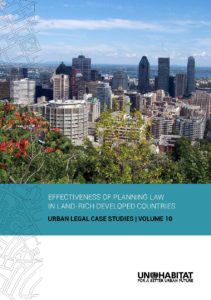Effectiveness Of Planning Law in Land-Rich Developed Countries
UN-Habitat has conducted an objective, evidence-based assessment on the application of physical planning laws in 18 cities of the Land-Rich Developed Countries Region. The selection of cities is based on the UN Global Sample of 200 cities as a statistically and regionally representative dataset. The study considers whether the law is being applied as written and informs the discussion on the effectiveness of legislative design. This publication portrays the findings from the study with empirical data on growth boundaries, population density, compliance with spatial planning and zoning, land management and staffing capacity. City managers in Land-Rich Developed Countries can use this information to rethink the sustainability of their urbanization model and to help them create systems that can result in equity, shared prosperity and environmental sustainability. These are key principles embodied under the New Urban Agenda and the 17 Sustainable Development Goals (SDGs) – particularly Goal 11.
- Downloads 29
- Views 189
- File Size 22.60 MB
- Languages 1


